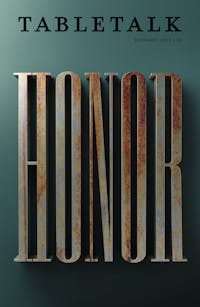
Request your free, three-month trial to Tabletalk magazine. You’ll receive the print issue monthly and gain immediate digital access to decades of archives. This trial is risk-free. No credit card required.
Try Tabletalk NowAlready receive Tabletalk magazine every month?
Verify your email address to gain unlimited access.
In ancient cultures, to honor someone was to acknowledge his importance and value in a way that was reflected in one’s life. In fact, the Hebrew word translated into English as “honor,” kabod, literally means “heaviness” or “weight.” So, to honor someone is to live life in such a way that that person proves to be heavy or weighty in one’s life. Therefore, it is not surprising that after giving instructions about how to honor God in the first four commandments (sometimes called the first table), God instructs us in the fifth commandment to “honor your father and your mother” (Ex. 20:12). For, in honoring their parents, children simultaneously learn how to honor the God whom their parents honor. Simply stated, children are to obey and honor their parents, because in so doing they learn to love and worship the living God. For this reason, cursing one’s parents in Scripture is tantamount to shaming God. This is why the penalty in Israel for cursing one’s parents was death (Ex. 21:17).
The command to honor our parents is picked up in the New Testament as well. Paul states in Ephesians 6:1–3: “Children, obey your parents in the Lord, for this is right. ‘Honor your father and mother’ (this is the first commandment with a promise), ‘that it may go well with you and that you may live long in the land.’ ” If children honor their parents, they are given the promise that they will “live long in the land” (Ex. 20:12; Prov. 2:21–22; Eph. 6:3). In other words, those who honor their parents find favor with God.
How are we to live out such an important command? And how are we to continue to honor our parents even as adults? Here are a few suggestions.
First, we must obey our parents in the Lord (Eph. 6:1). This means obeying our parents on all points that do not contradict our faith. Obviously, this will look different after we leave our parents’ household, but there is a way to pay deference to and show respect to our parents’ desires that honors them, even in disagreement, throughout the course of life.
Second, we must love our parents as ourselves. Jonathan Edwards argues that love is the ground of honor because true love for someone disposes us to honor them. Paul describes this type of love we are to display to others in 1 Corinthians 13:4–6: “Love is patient and kind; love does not envy or boast; it is not arrogant or rude. It does not insist on its own way; it is not irritable or resentful; it does not rejoice at wrongdoing, but rejoices with the truth.” This love endears our hearts to our parents and shows us practically how we can honor them. We demonstrate true humility toward them by treating them with patience and kindness. In every way, we are also to lift up the “truth” in our relationships. This includes pointing unbelieving parents to the gospel. It means discussing the truths of the Word of God with our parents and then proving that we value its truth by obeying it.
Third, and this is critically important, we are to honor the legacy of our parents. In this way, we can honor them long after they are gone. Every life is valuable and esteemed by God. There are points of common grace even in the lives of unbelieving parents. So, whatever is honorable, true, and good in their lives is a part of their legacy. And we honor our parents when we carry that legacy on—when we think about who they were, what they loved, and how they lived. When we inculcate those values in our own lives, we honor them.
My father, Kelly Castleberry, stepped into eternity on September 23, 1986, when he was just twenty-six years old. He was involved in a Marine Corps plane crash over the Atlantic Ocean, and for a week afterward, Navy search and rescue teams combed the ocean, but his body was never recovered. His official status remains “Lost at Sea, Presumed Dead.”
A few months before he died, he was invited to a mandatory “call-sign” party with his squadron at a beach house, where each new pilot was to receive his call-sign. Unbeknownst to him, strippers were also invited to the party. Instead of taking part in the festivities of the evening, he stood in the back corner of the room with his hand over his eyes, refusing to look. After his death, one of the other pilots gave my mom a picture that was taken during that evening. Sure enough, in the back of the picture, you can see my father with his hand covering his eyes. As I write this, I am looking at that picture, which sits always on my desk and has had a profound impact on my life.
The legacy of purity that he left will always be with me. And I will teach it to my son and daughters and to their children. In so doing, we honor my father. But most importantly, we honor God.
